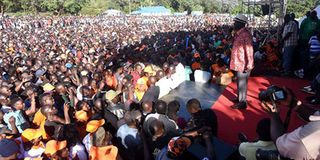Kibra by-election was a sign of looming chaos in the next polls

ODM leader Raila Odinga addressing his supporters at DC grounds in Kibra, Nairobi, on November 10, 2019 after the party's candidate - Bernard Okoth - won the Kibra parliamentary by-election. Those spurring poll violence must be stopped in their tracks. PHOTO | EVANS HABIL | NATION MEDIA GROUP
What you need to know:
- The violent images seen, some involving supposedly respectable MPs, remind us that the inconclusive ICC trials were not an effective deterrent.
- It is time we looked at Kibra not just as a premature tussle between DP Ruto and Mr Odinga but a test case for our commitment to clean, orderly and peaceful elections.
Former Kakamega senator Boni Khalwale became an internet star as images from his rock-throwing antics went viral, spawning memes that certainly lifted the gloom out of the Kibra by-election.
In other circumstances, the parliamentary by-election might have been held up as an example of the passion, vibrancy and sheer enthusiasm of Kenyan democracy at work.
But the Kibra poll concluded last week instead serves as a sad reminder of the spiteful, vindictive, hateful and divisive nature of Kenyan politics.
And, worse, of the violence that lurks just below the surface and at any moment threatens to escalate into full-scale warfare.
It was rightly played out as a duel between Deputy President William Ruto and the leader of the former opposition movement, Raila Odinga.
SUCCESSION POLITICS
Their actual candidates — retired football star McDonald Mariga for DP Ruto’s faction of the ruling Jubilee Party and Bernard Imran Okoth on the ticket of Mr Odinga’s ODM — were reduced to mute irrelevance as the two protagonists and their heavy lifters went hammer and tongs at each other.
The Ruto-Raila supremacy duel was also seen as a dress rehearsal ahead of bigger wars in the lead-up to the 2022 presidential and General Election.
An advance battle is expected soon if the Building Bridges Initiative championed by Mr Odinga and President Uhuru Kenyatta calls for a constitutional referendum, which supporters of the Deputy President are already primed to reject.
Mr Odinga got bragging rights from the Kibra result but it was hardly magnanimity in victory.
From his lieutenants and cheerleaders, it was chest-thumping histrionics and elated celebration of the strong-arm tactics they employed to shut out rival parties from his “bedroom”.
EERY PAST
And from DP Ruto, it was not graciousness in defeat but a churlish concession that attempted to project the loss as a victory.
It was followed immediately by an orchestrated cacophony of finding excuses for defeat in the violence allegedly perpetrated by Mr Odinga’s foot soldiers.
Kibra was just a single constituency. Multiply the violence, insults, marauding gangs and thuggery witnessed there to the scale of a national referendum or a General Election in every one of 40,000-plus polling stations across the country and you might just get an idea of the dangers that lie ahead.
We clearly have not learnt lessons from the past. The disputed 2007 elections unleashed an orgy of violence that nearly plunged Kenya into the abyss of civil war and genocide.
More than 1,300 people were killed, and those are very conservative official figures, and another half a million driven from their homes in an organised ethnic cleansing.
Mr Kenyatta and DP Ruto, then leading opposite sides on the conflagration, were hauled before the International Criminal Court (ICC) to answer charges of crimes against humanity. However, inept investigations and prosecutions saw the trials halted.
DEBASED TACTICS
The 2007 violence was not an incidental conflict but just the latest in a series dating back to the multiparty campaign in 1990, when the one-party Kanu regime of President Daniel arap Moi uncorked the genie of violence in a vain attempt to counter the proponents of change.
The idea then was to secure Mr Moi’s Rift Valley “bedroom” from new-fangled ideas such as democracy, human rights and the freedom of political participation.
It is, thus, quite rich of Mr Moi’s political heir Ruto to cry foul when the tactics that he endorsed are used against him.
But it is still not right for one of the principal victims of Mr Moi’s dictatorial rule, Mr Odinga, to countenance political zoning and bully-boy tactics to ring-fence his political base.
It is true that no death or serious cases of large-scale mayhem were reported in Kibra, but the violent images seen, some involving supposedly respectable MPs, remind us that the inconclusive ICC trials were not an effective deterrent.
CLEAN ELECTIONS
The threat of electoral violence still looms large, and it does not help that the police too often prefer to look the other way.
If we don’t deal with that kind of impunity now, violence will sooner or later revisit us with a fury that will make 2007 look like a nursery school romp.
If Inspector-General of Police Hillary Mutyambai and Director of Public Prosecutions Noordin Haji are unable, or unwilling, to come down hard on the merchants of electoral violence, then we must ask them to step aside as we open doors to intervention from international justice mechanisms.
It is time we looked at Kibra not just as a premature tussle between DP Ruto and Mr Odinga but a test case for our commitment to clean, orderly and peaceful elections.
[email protected] @MachariaGaitho




